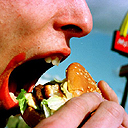
Britons are unaware that obesity is putting them at a higher risk of cancer, an NOP poll for Cancer Research UK has revealed.
The survey of more than 1,000 people found only that 3% of people knew that being overweight increased the risk of dying prematurely compared with normal weight, although 70% recognised the link between obesity and heart disease.
Cancer Research UK has launched Race For Life, sponsored by Tesco, which aims to raise £20m for cancer research. An estimated 325,000 women are expected to run, jog or walk 5km during May, June and July as part of the campaign.
Sally Gunnell, a former Olympic athlete and Race For Life supporter, said: "The Race for Life is a perfect starting point for those who are new to exercise or who have weight to lose. It's an event for women of all ages and levels of fitness, with the emphasis on taking part."
"Excess body fat is not harmless 'extra padding', but active tissue producing hormones that can increase the risk of cancer," said Professor Jane Wardle, the director of Cancer Research UK's health behaviour unit.
"In order to lose weight and then maintain a healthy body weight you need to eat less and be more active. Even small weight losses have been shown to have a beneficial effect on health."
Dr Lesley Walker, Cancer Research UK's director of cancer information, found the survey results "extremely worrying". She said: "Post-menopausal women who are overweight have a greater risk of developing breast cancer and there is also evidence of a link between being seriously overweight and cancer of the womb, kidney, bowel and oesophagus."
Experts are not sure why obesity affects breast cancer risk after menopause but one possibility is that fat cells produce the hormone oestrogen, which stimulates some types of breast cancer growth. Before menopause, oestrogen regulates the menstrual cycle but after menopause, oestrogen levels fall dramatically.
In obese women fat cells can become the main source of oestrogen, upsetting normal post-menopausal levels of the hormone in a woman's body.
In 2002 studies showed more than half of the UK's population was either overweight or obese - 70% of men and 63% of women. Obesity in adult women nearly trebled between 1980 and 2002 from 8% to 23%, while for men obesity nearly quadrupled over the same period from 6% to 22%.
How to measure obesity
Find out whether your weight is in the healthy range by calculating body mass index (BMI).
1. Work out your height in metres and multiply the figure by itself.
2. Measure your weight in kilograms
3. Divide the weight by the height squared - (the answer to No1). For example you might be 1.6m (5ft 3in) tall and weigh 65kg (10st). The calculation would then be:
1.6 x 1.6 = 2.56. BMI would be 65 divided by 2.56 = 25.39.
BMI ranges:
Less than 20 - underweight
20-25 - healthy weight
25-30 - overweight
30-40 - obese
over 40 - very obese

